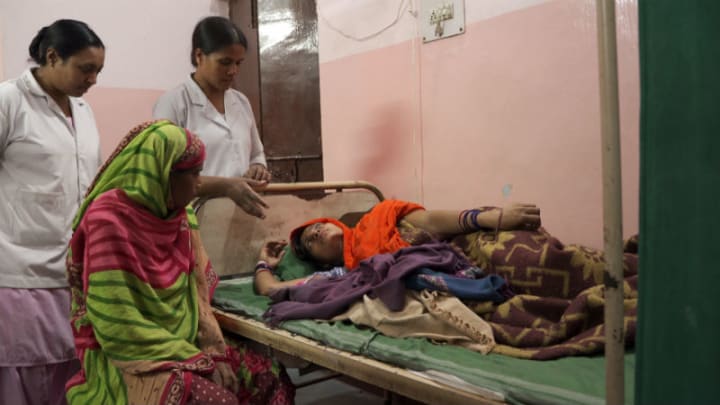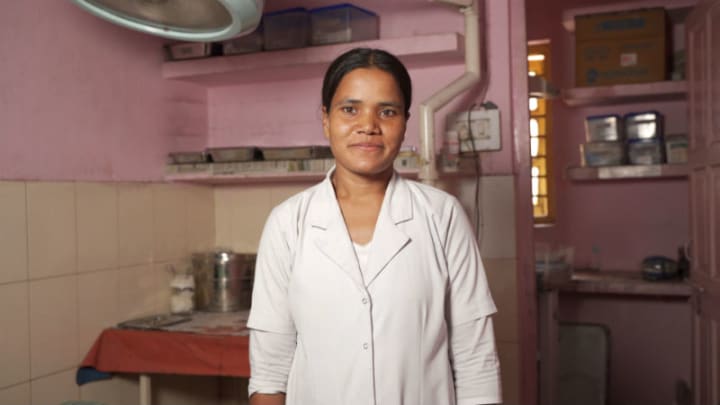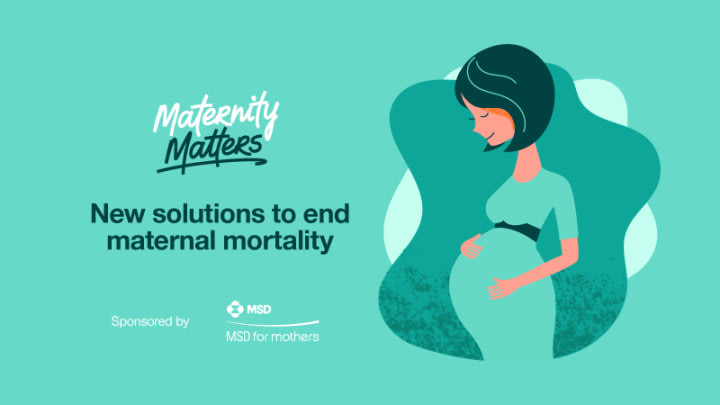
Rani Lakra has had a long night. She has delivered three babies overnight, which she said is fewer than her daily average workload. Lakra has been working in a small private hospital in Bokaro, a sparse setting located in India’s eastern state of Jharkhand, for the past 10 years. Like many others in similar areas, she has had little formal training and has learned to deliver babies and manage complications that occur on the operating table.
“I saw what the doctors did and learned from them. I now deliver up to 35 babies in a day,” she said.
“We should be able to deliver what people are expecting — this is where Manyata will be very important.”
— Dr. Nandita Palshetkar, president, FOGSIIt is for health workers like Lakra that Manyata — a quality-improvement and certification program that aims to increase adherence to clinic standards among providers in India’s growing private maternal health care system — can prove beneficial.
A lack of trained health care workers poses a serious challenge for the achievement of universal health care in India. Programs like Manyata can contribute to bridging the gap between the demand for fully equipped human resources and an increasing population seeking institutional medical care.
The rationale behind the program is to align quality standards in the private sector — where over a third of women seek maternal health care — with those of the public sector, with the aim of achieving standardization across a “mixed health system,” according to the World Health Organization.
Over five days, health workers employed in hospitals are trained in a set of 26 quality standards — ranging from preparing for safe delivery to ensuring adequate postpartum care. The standards defined under the initiative are in line with the Indian government and the World Health Organization standard guidelines.
Manyata is implemented by the Federation of Obstetric and Gynecological Societies of India, or FOGSI, a professional association of 35,000 obstetricians and gynecologists that aims to improve and benchmark quality of care for private providers who cater to women in low- and middle-income areas. Through its network, this influential industry body hopes to take its expertise to women who aren’t able to access quality care through private hospitals. The program is supported by MSD for Mothers and the MacArthur Foundation as funding partners, and Jhpiego as a technical assistance partner.
WHO has commended India for its progress in reducing its maternal mortality ratio by 77% from 1990 to 2016, when it dropped to 130 per 100,000 live births, putting the country on track to achieve the Sustainable Development Goal target of 70 by 2030. One reason for India’s relative success has been its push to increase access to quality maternal health services. The proportion of institutional deliveries in public facilities has risen from 18% in 2005 to 52% in 2016; including private facilities, this number reached 79%.
However, with no clear consensus on quality standards for maternal health care in India, quality of care can often be inconsistent. Manyata presents a mechanism for improving this inconsistency by ensuring a set of quality standards are adhered to.
Rising demand for the private sector
Sadija Khatum looks tired but relieved. Eight hours ago, Lakra had helped deliver the 22-year-old’s baby boy, who now lies next to her on an iron-framed bed. There are two other beds in the corridor where she’s admitted, as the rooms in the private nursing home are all full. But nurses hover around, making sure the mother and child are taken care of. “I traveled to Bokaro from my village across the border from West Bengal because people told me this is a good nursing home,” Khatum said.
A daily wage laborer, Khatum is the first in her family to have an institutional delivery — something that still remains out of reach for poor women, especially in rural India. Manyata’s clinical standards seek to benefit women like Khatum who have limited access to health care.
“Almost 40% of people are now going to private sector,” Dr. Nandita Palshetkar, president of FOGSI, told Devex. “We need to address [this and ensure] they’re up to the quality. We should be able to deliver what people are expecting — this is where Manyata will be very important.”
Manyata was launched in 2013, implementation began in 2016, and the program now reaches over 400 private health facilities. It follows a three-step process: identification of health facilities, training, and assessment that leads to accreditation with a Manyata certification. Mostly meant for nurses and other support staff, the training was launched with the demonstration and practice of 16 clinical standards, with an additional 10 facility standards added this year.
Manyata caters to both small and large private health facilities. While the one in Bokaro is a 50-bed hospital, bigger ones with a capacity of up to 500 beds in larger cities have also sought the Manyata brand, Palshetkar said, recollecting that at the last FOGSI annual meeting, more than 300 doctor-members had requested training for their hospital staff.
Dr. Samita Bhardwaj, national program manager at FOGSI, said that the certification is accessible regardless of the size of the hospital, thus ensuring that there are common standards across the board, even as India’s maternal health care systems boom.
“These standards stress more on the knowledge and not on infrastructure, and hence are applicable regardless of the size of the hospital. To make it easy and accessible, the [clinical] standards were limited to 16 that are nonnegotiable from the original 37,” Bhardwaj said.
Following the first two years — during which the program reached 300 hospitals — the idea is to scale up and work with health workers across 2,000 hospitals this year, FOGSI’s Palshetkar said. “We wanted [to] go slow so that we understand what are the difficulties and how we can tackle them.” The program currently operates in five Indian states: Maharashtra, Uttar Pradesh, Rajasthan, Karnataka, and Jharkhand, where Lakra works. The goal is now to scale the reach of this quality-improvement program.

Scaling up
Dr. Nivedita Datta, a Manyata champion in Bokaro, has conducted and assessed training in the state. She underlines the need for a program like Manyata in Jharkhand.
“Maternity services are underpaid in the state. So many nursing homes sprout that [are] without doctors … only nurses who are paid INR 1,000-1,500 ($14-22 per month), who are not trained and lack basic knowledge,” Datta said. “It is not their fault, but they need to be trained. That is why we should go down to them and reach out.”
Once scaled, Manyata has the potential to reach such nursing homes across the country, thus ensuring quality maternity services even in resource-poor settings.
However, a requirement of the Manyata program — that every hospital should have at least one FOGSI representative associated with it — is holding back new registrations in the state.
“If we don’t go to these hospitals where there are no doctors, but women are still getting treatment, then we really can’t bring down maternal mortality,” Datta explained.
Other FOGSI representatives such as Palshetkar defend the requirement, stating that it ensures uptake and accountability. The focus, therefore, will be on encouraging more FOGSI members to become ambassadors of the program in their own towns and cities.
Another challenge is ensuring financial sustainability. Currently, every hospital that wants to apply for the training and accreditation has to pay INR 20,000 ($294). So far, the training has been covered by grants from organizations such as MSD for Mothers, but those involved say that has not proved to be a sustainable model, as convincing hospitals of the worth of investing in the training hasn’t been very successful to date.
Palshetkar is aware of these limitations. “We need to scale up — and there are three ways to do so,” she said. “One is use technology to scale up by using a digital platform; second is to make the training and certification program self-sustainable so that it’s not dependent only on grants; and finally, getting more stakeholders involved by improving the number of trainers will be crucial.”
Appointing doctors as “champions” and reaching out to more private health facilities in nonurban areas is key, she said. “We need to use FOGSI at a more grassroot level and have more Manyata champions in the community.”
The program has successfully integrated a digital platform, Manyata ECHO. Palshetkar sees this being expanded and used for training, too. “The question is: ‘How do you make it cost-effective?’ Training larger groups and using virtual learning are two ways.”
It is clear that the program must use its strengths to address the gaps — both in the system and in implementation.
“It’s a matter of advocacy. Accreditation is creating a buzz, and we’re happy about that,” said Palshetkar.
Back in Bokaro, Khatum gets ready to leave the nursing home and take her baby home. Lakra has talked to her about breastfeeding, caring for the baby, and taking care of her own health. But for Khatum, the worst is over. “My blood group is A-negative, and I was very worried about not finding blood,” she said. “We’ve heard bad stories about pregnant mothers in my village. I’m glad I’ve had a safe delivery, all thanks to Nurse Lakra.”
The Maternity Matters series is sponsored by MSD for Mothers, MSD’s $500 million initiative to help create a world where no woman has to die giving life. The content of this article is the responsibility of the author(s) and does not necessarily represent the official views of MSD. MSD for Mothers is an initiative of Merck & Co., Inc. Kenilworth, N.J., U.S.A.





